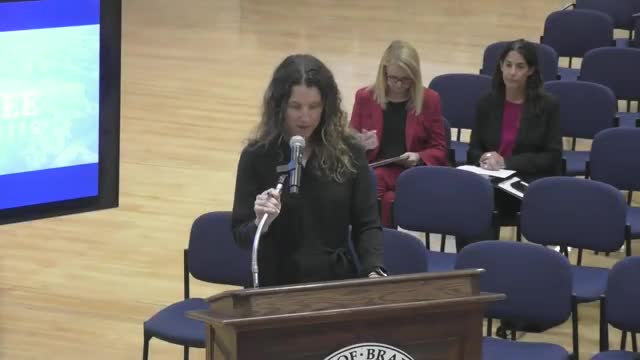Mayor Joyce presents $175.7 million FY26 budget, flags school and special-education funding pressures
Get AI-powered insights, summaries, and transcripts
Subscribe
Summary
Mayor Joyce presented the administration's FY2026 budget book to the Town Council, describing a $175.7 million proposal that preserves services, directs 60% of spending to schools, assumes 2% COLAs, and proposes new funds for facilities and special education stabilization.
Mayor Joyce presented the Town of Braintree's FY2026 budget to the Town Council on April 29, outlining a $175,700,000 budget that the administration describes as "stable, responsible, and balanced." The mayor said the proposal preserves current service levels, does not rely on one-time free cash for operations, and directs roughly 60% of town spending toward school-related activity.
Key proposals and assumptions the mayor highlighted include: a projected 2.9% spending growth overall; an assumption of 2% cost-of-living adjustments for bargaining units (collective bargaining remains under negotiation and any settlements above assumptions would affect projections); a proposal to raise the senior property tax work-off credit ceiling from $1,500 to $2,000; a proposal to create a facilities revolving fund to collect and spend user fees for building maintenance and show how those fees are spent; and a proposed special education stabilization fund to be seeded with $600,000 from town land sales to help smooth volatile special-education costs (the mayor said this would be used to offset East Middle School debt service and other special-education budget pressure).
The mayor reviewed fiscal-context risks, including limited growth in local aid (noting an assumption of 0.1% growth rather than 1%), uncertainty in federal funding flows, growing school costs and pension/insurance obligations, and the budget impact from a recent wrongful-conviction settlement. She said the FY26 budget incorporates the new debt-service obligation related to that settlement (the mayor noted a debt-service charge of $786,000 in FY26) and that the town continues to pursue insurance recoveries.
The mayor introduced a new budget book structure and invited Council members to provide feedback; she noted the administration will publish the book on the town website and that the Ways & Means Committee will begin budget hearings in May. Councilors thanked department heads and urged residents to tune in to the committee hearings.
Why it matters: The budget frames policy priorities—education, infrastructure, community services—and signals where future tradeoffs may occur, particularly if collective-bargaining settlements or revenue assumptions change. The mayor said the budget is designed to avoid the cycle of recurring service reductions and to rely less on one-time revenue.
The council did not vote on the budget at the meeting; the Ways & Means Committee will hold a series of budget hearings in May to review specific departmental requests and assumptions.
